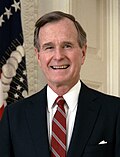| Ronald Reagan for President 1984 | |
|---|---|
 | |
| Campaign | 1984 Republican primaries 1984 U.S. presidential election |
| Candidate | Ronald Reagan 40th President of the United States (1981–1989) George H. W. Bush 43rd Vice President of the United States (1981–1989) |
| Affiliation | Republican Party |
| Status | Announced: October 17, 1983 Official nominee: August 23, 1984 Won election: November 6, 1984 Certification: January 7, 1985 Inaugurated: January 20, 1985 |
| Slogan | Morning in America Bringing America Back... Prouder, Stronger, and Better |
The 1984 presidential campaign of Ronald Reagan was a successful re-election campaign for President of the United States in 1984 by incumbent president Ronald Reagan, who had taken office on January 20, 1981. Reagan and incumbent vice president George H. W. Bush defeated Democratic presidential nominee, and former Vice President under Jimmy Carter, Walter Mondale and vice presidential nominee Geraldine Ferraro. Reagan, a Republican president and former Governor of California from 1967 to 1975, launched his presidential bid on January 29th, 1984, and secured the nomination for his re-election on August 23, 1984.
Contents
- Chronicle
- Primaries
- Republican National Convention
- Opinion polling
- See also
- References
- External links
Reagan authorized the formation of his 1984 campaign committee, Reagan-Bush '84, on October 17, 1983. [1] [2] He made the formal announcement of his candidacy for reelection on January 29, 1984. [3] On August 23, he secured the nomination of the Republican Party at its convention in Dallas, Texas. [4] The convention nominated Bush as his running mate. [5]
On November 6, 1984, Reagan carried 49 of 50 states, winning the election with 58.8 percent of the popular vote and 525 electoral votes. Mondale carried only his home state, Minnesota, and the District of Columbia, receiving 40.6 percent and 13 electoral votes. [6] [7] Reagan's reelection was confirmed by the Electoral College on December 17 [8] and certified by the joint session of the U.S. Congress on January 7, 1985. [9] At 73 years old, Reagan was then the oldest incumbent president to win a presidential election. He was inaugurated for his second term on January 20, 1985.



